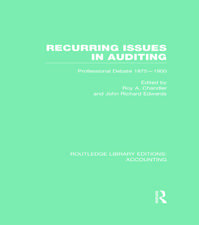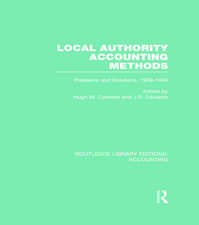Public Budgeting in African Nations: Fiscal Analysis in Development Management
Editat de Peter Fuseini Haruna, Shikha Vyas-Doorgapersaden Limba Engleză Hardback – 4 apr 2016
This book adopts an interdisciplinary/pragmatic approach to analyze and present research findings on public budgeting as a sustainable development tool. The central argument is that development practice will benefit from a bottom-up, decentralized approach to budgeting and fiscal policy management, involving national, sub-national, and civil society institutions. From this perspective, a balanced budget should draw from and reflect values and priorities across the full spectrum of social and political life.
Preț: 1007.36 lei
Preț vechi: 1228.49 lei
-18% Nou
Puncte Express: 1511
Preț estimativ în valută:
192.76€ • 201.76$ • 160.44£
192.76€ • 201.76$ • 160.44£
Carte tipărită la comandă
Livrare economică 31 martie-14 aprilie
Preluare comenzi: 021 569.72.76
Specificații
ISBN-13: 9781498742139
ISBN-10: 1498742130
Pagini: 386
Ilustrații: 32
Dimensiuni: 152 x 229 x 25 mm
Greutate: 0.66 kg
Ediția:1
Editura: Taylor & Francis
Colecția Routledge
Locul publicării:Oxford, United Kingdom
ISBN-10: 1498742130
Pagini: 386
Ilustrații: 32
Dimensiuni: 152 x 229 x 25 mm
Greutate: 0.66 kg
Ediția:1
Editura: Taylor & Francis
Colecția Routledge
Locul publicării:Oxford, United Kingdom
Public țintă
Academic, Postgraduate, Professional, Professional Practice & Development, and UndergraduateCuprins
1. Public Budgeting and Fiscal Sustainability in African Nations: Opportunities and Challenges in Development Management Peter Fuseini Haruna 2. Public Budgeting in Africa: The Case of Botswana Taolo B. Lucas and Theophilus T. Tshukudu 3. Public Budgeting in African Nations: The Case of Cameroon Peter Ajongwa Ngwafu and Viviane E. Foyou 4. Economic Policy Formation in Ghana’s Fourth Republic: The Budgeting Process as a Ritualized Anti-National Transformation Act Lloyd G. Adu Amoah 5. Reforming the Ghanaian Budget System from Activity-Based Budgeting to Performance-Based Budgeting: Eureka, or Another Reform Illusion? Frank L. Kwaku Ohemeng 6. Public Budgeting in African Nations: The Case of Kenya Abel Kinoti Meru and Rogers Kinoti M’ariba 7. Public Budgeting in African Nations: The Case of Malawi Happy Mickson Kayuni 8. Public Budgeting in African Nations: The Case of South Africa Gerrit van der Waldt and Shikha Vyas-Doorgapersad 9. Public Budgeting in African Nations: The Case of Uganda Benon C. Basheka 10. Public Budgeting in Zimbabwe: Trends, Processes and Practices Gideon Zhou, Ricky Munyaradzi Mukonza, and Hardlife Zvoushe 11. Public Budgeting in African Nations: The Case of Rwanda Dominique E. Uwizeyimana 12. Public Budgeting and Service Delivery in Tanzania Denis J. Kamugisha and John S. Kihamba 13. Evaluating Public Budgeting and Fiscal Administration in African Nations Peter Fuseini Haruna and Shikha Vyas-Doorgapersad
Notă biografică
Peter Fuseini Haruna is Professor of Public Administration at Texas A&M International University, USA and a 2010–2011 Fulbright Senior Scholar to Ghana.
Shikha Vyas-Doorgapersad is Professor of Public Management and Governance at the University of Johannesburg, South Africa.
Shikha Vyas-Doorgapersad is Professor of Public Management and Governance at the University of Johannesburg, South Africa.
Descriere
Africa stands at a public budgeting and fiscal administration cross-road. On the one hand, incomes, education, and life-expectancy rates are all on the rise. On the other hand, poverty is still widespread and economic inequality is widening. Now more than ever, it is important for administrators to ask the complicated questions about how African nations should be allocating their fiscal resources to advance the course of judicious development, especially given population growth, quality of life demands, and a growing need for government accountability. This book compiles chapters from authors across countries to address the complex issues involved with decision-making and implementation.









